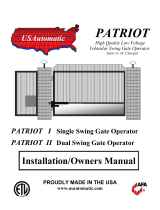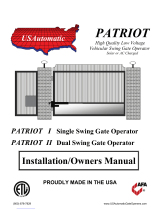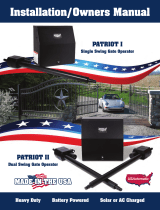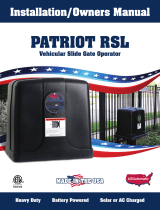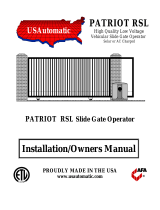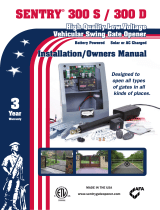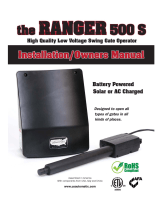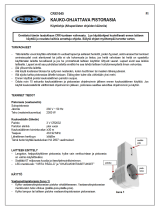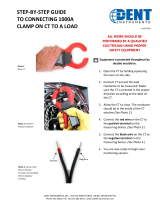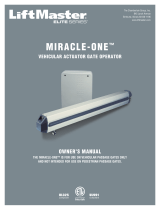Page is loading ...

PATRIOT
High Quality Low Voltage
Vehicular Swing Gate Operator
Solar or AC Charged
PATRIOT I Single Swing Gate Operator
PATRIOT II Dual Swing Gate Operator
Installation/Owners Manual
PROUDLY MADE IN THE USA
www.usautomatic.com
USAutomatic


1
INTRODUCTION
This operator is intended to be installed on vehicular Class I or Class II gates as defined
by UL-325. Maximum gate load should not exceed 650 pounds.
PLEASE READ THIS ENTIRE MANUAL CAREFULLY PRIOR TO INSTALLATION.
Perform the installation in step-by-step order you will achieve optimal results. We
strongly recommend that all installation and service personnel pay particularly close
attention to the safety systems section of this manual and UL-325. In addition to the
current sense feature that is provided, other safety devices are necessary to make
each particular installation as safe as possible to reduce the risk of personal injury
and/or property damage. A trained and authorized service technician or the
factory should be consulted for assistance.
Cautions - Very Important
Do not attempt to enter the gate area while the gate is moving. Wait until the gate comes
to a complete stop.
Operate the gate only when it is fully visible, free of persons or obstructions, and
properly adjusted.
Do not allow children to play in the area of the gate. Do not allow anyone to ride on the
gate.
Do not allow children to play with the remote control or any other activation device.
Do not attempt to "beat the gate" while the gate is opening or closing. This is
extremely dangerous.
Test the current sense feature and all safety devices regularly to insure correct
operation.
Study the entire Safety Section (page 22-25), paying particularly close attention to the
Entrapment zones on page 23-25 and be aware of these areas not only during use but
also during any adjustments to the unit.
The USAutomatic battery charger is designed to operate with +12 vdc deep cycle
batteries rated at 33-amp hour minimum. Gel type or AGM batteries are
recommended.
Modifying the charger AC supply cord will void the charger warranty.
Other Safety Standards
All control stations should be located at least 6 feet from any moving part of the gate
or operator.
Never install any control device where a user will be tempted to reach through the
gate or fence to activate a gate.
© USAutomatic, LTD - 2005 rev ZK
All rights reserved. No part of this may be reproduced by any means
without the expressed written consent of the publisher.

2
Table Of Contents Page
Introduction ............................................................................................. 1
Table of Contents .................................................................................... 2
General Requirements/Gate Qualifications & Applications................... 3
Importance of a Properly Designed Gate ................................................ 4
Mounting Site Review............................................................................. 4
Parts Included List................................................................................... 5
Hinge Mount Tube Installation/Pull to Open.......................................... 6
Hinge Mount Tube Installation/Push to Open/Vertical Height .............. 7
Gate Bracket Installation/Pull to Open ................................................... 8
Gate Bracket Installation/Push to Open/Diagrams ................................. 9
Mounting the Control Box/Splicing Actuator Cable ............................. 10
Installation of Charging Device ............................................................. 11
Connecting Actuator Cable and Charging Device to battery................. 11
Connecting Actuator Cable to Control Board........................................ 12
Current Sense Adjustment...................................................................... 12
Control Board Dipswitch Setting Verification/Operating the Gate....... 13
Programming Transmitter and Receiver/Keypad ............................. 14-17
Making Final Adjustments/Installing Antenna Assembly ..................... 17
Installing Safety Placards/Installing Secondary Entrapment Siren........ 17
Limit Switch Adjustment ....................................................................... 18
Control Board Terminal Description For Accessories........................... 19
Function of Programming Switch Settings DS1 .................................... 20
Function of Programming Switch Settings DS2 .................................... 21
Emergency Manual Release ................................................................... 21
Safety Section.................................................................................... 22-25
Periodic Service...................................................................................... 26
Troubleshooting Introduction................................................................. 26
Troubleshooting Guide...................................................................... 27-33
Accessory Wiring Diagrams ............................................................. 34-36
Magnetic Wire Sensing Loops .......................................................... 37-39
Warranty Statement / Mail in Registration ..............................Back Cover

3
GENERAL REQUIREMENTS
General hand/tools such as combination wrenches, tape measure, level, clamps, etc. are required.
Your particular installation may require a drill or other hardware not provided. Welding by a
qualified welder is the recommended method of securing the linear actuator mounts to the gate
and hinge post. Bolt on brackets is an option, but they must be very securely attached (i.e.
carriage bolts with lock nuts and washers). Lag type bolts are not recommended. Loose or
unstable operator mounts will result in improper operation.
BATTERY REQUIRED FOR OPERATION (NOT INCLUDED).
We recommend a +12 vdc deep cycle Gel or AGM battery rated at a minimum of 33-amp hours.
The actuator harness is equipped with 3/8” ring terminals designed to connect to bolt type battery
posts. The USAutomatic charger is designed for this type of battery. Using a smaller amp hour
battery may cause damage to the charging system.
IMPORTANT CAUTIONS:
1. Do not test or operate this unit without the actuator securely attached to the gate. Serious
damage to the actuator limit switch assembly may occur if attempted.
2. Do not perform any welding while the actuator cable is plugged into the control board or with
the battery connected. Serious damage to the control board and/or battery will occur if
attempted.
3. Always disconnect the battery power from the unit prior to connecting any devices.
GATE QUALIFICATIONS/APPLICATIONS
GATE LENGTH/WEIGHT
This gate operator is rated for vehicular class I or class II swing gates up to 16 feet in length and
up to 650 pounds in weight, as defined by UL-325. If your gate exceeds either one of these
limits, please consult a qualified technician or the factory for alternative solutions.
(Example: Convert one 20' gate into two 10' gates and use a dual gate operator.)
Note: The total gate opening normally cannot exceed 110 degrees.
Consult a service technician or the factory if greater opening is required.
GATE CYCLES PER DAY
Solar charged systems have a limit on the number of cycles they can provide on a daily basis.
System design must consider stand-by current consumption of all accessories and number of
cycles expected per day. A solar operator will not need additional solar panels in most
installations if solar friendly accessories are used. Contact the factory for help designing a solar
friendly system. This actuator type opener, whether AC or Solar charged, should never be used in
applications, that require 150 or more complete open/close cycles per day. Holding the gate open
can decrease cycles during high cycle time periods. A high traffic gate operator should be used if
more cycles are required.

4
IMPORTANCE OF A PROPERLY DESIGNED GATE
As a general rule, an automatically operated gate, must be stronger and smoother than
a manually operated gate. Since the gate is a major component of the system, great
care and concern must be given to the gate design.
A GATE OPERATOR CANNOT OVERCOME A POORLY DESIGNED GATE.
A. Does the gate swing smoothly without binds or excessive resistance? Swing gates
should swing level and plumb to prevent the operator from having to lift the gate
open or closed. Swing gates should not require a wheel to support them. Wheels
usually create drag, which will cause operator problems. A wheel is generally a sign
of a weak hinge system or a weak gate frame.
B. Is the gate frame of substantial strength without excessive weight? Will the frame
withstand normal wind load conditions without sway or vibration? Will the gate
close correctly without being hand-guided or lifted to close?
C. Are the hinges suited for the number of cycles expected per day?
We recommend bearing type hinges to reduce friction drag.
D. Will a reinforcement brace be required to attach the operator to the gate or
does a suitable cross member exist in the gate design?
If any of these problems exist, they must be corrected to achieve a reliable automatic
gate system.
MOUNTING SITE REVIEW
Installers should ask themselves these questions prior to installation and predetermine
the solution to any problems, which may occur.
A. Does sufficient space exist for mounting and future servicing of the operator and
control box?
B. Will the unit push the gate open to the outside or pull the gate open to the inside?
C. How will the actuator mounts be secured at the hinge and to the gate?
D. How will the control box be mounted so it is secure enough to support the weight of
the battery and be located within 8 feet of the actuator arm to prevent splicing of the
actuator cable?
E. How will power be brought to the control box if AC charged?
E. How and where will the solar panel mount if solar charged so that optimum
sunlight is received?
G. How will exterior control wiring, if any, be brought to the control box?
H. Have all safety concerns been addressed? (See Safety Section Pgs. 22-25)

5
PARTS INCLUDED
Cabinet with Control Board
and Receiver
OR
*For Patriot II quantity is doubled.
Additionally, 40’ of Master/Slave Actuator cable provided with the Patriot II
Placards (Two supplied) should be visible from inside and outside of gate.
NOTE: +12 Volt DC deep cycle battery 33-amp hour minimum required. (Not Included)
*Actuator Cable
Strain Relief Clamp
Snap in Grommet
2” X 2” X 17”
*Hinge Mount
Tube
Battery
Charger
Solar Panel with Bracket
and hardware
*5- ½” washers
*1- ½” Locknuts
2- Placards
* ½” X 4 ½” Bolt
*Manual Release Pin
And Clip
Secondary
Entrapment Siren
+12vdc
* Gate Bracket
Antenna Assembly
with coax and bracket
*Actuator Arm with 8 foot of Cable
WARNING
A Moving Gate Has The Potential Of Inflicting Serious Injury Or Death
Persons are to keep clear! The gate is able to be moved without prior warning.
Do not let children operate the gate or play in the gate area.
Persons are to operate the gate only when the gate area is in sight and free of people and obstructions.
Solar Panel
1- 2 button
Transmitter

6
STEP 1 Hinge Mount Tube Installation
Using the diagrams in Figure 1 below determine the type of installation and gatepost to be used. These
diagrams show left hand installation reverse for right hand installation. Figure 2 and 3 show installation for
thick wall post.
PULL TO OPEN POST TYPE PUSH TO OPEN
STEP 2 Hinge Mount Tube Installation (Pull to Open Installation Top View)
Use dimensions in figure 2 to determine mounting location of Hinge mount tube, cut hinge mount tube as
necessary to achieve correct mounting dimension. Option 1 offers maximum strength.
GATE IN CLOSED POSITION
Thin wall steel post.
Add support to
p
revent twisting.
Support not needed if
using thick wall post
as shown in Figure 2.
GATE IN CLOSED POSITION
4” round steel post.
Saddle cut tube to fit.
Wood post
add metal plate
bolt on with
½ inch Carriage
bolts/washers/nuts.
GATE IN CLOSED POSITION
OPEN DIRECTION
OPEN DIRECTION
OPEN DIRECTION
OPEN DIRECTION
GATE IN CLOSED POSITION
GATE IN CLOSED POSITION
GATE IN CLOSED POSITION
OPEN DIRECTION
OPEN DIRECTION
FIGURE 1
Hinge mount tube cut as necessary to
achieve dimension needed.
Must be level in all directions for proper
alignment and operation.
Figure 2
B
13”
A
6”
Option 1
GATE
Option 2
Gate post 4” steel shown
¼” wall.
B
13”
A
6”
For 90 degree opening 6” and 13” as shown
For 100 degree opening 7 1/2” and 12”
For 110 degree opening 9” and 10 1/2”
For 120 degree opening 11” and 8”
GATE
OPEN DIRECTION
HINGE

7
STEP 2a Hinge Mount Tube Installation (Push to Open Installation Top View)
Use dimensions in figure 3 to determine mounting location of Hinge mount tube, cut hinge mount tube as
necessary to achieve correct mounting dimension.
Regardless of method used, the hinge mount tube should be very secure since the entire force of the gate is
directed to this mount. The post must be of adequate strength to resist twisting as well.
STEP 3 Hinge Mount Tube Installation (Vertical Height Positioning)
NOTE: The gate bracket vertical mounting location on the gate must be determined before installing
the hinge mount tube. The approximate distance from the hinge to the gate bracket mounting
position is 55”. The exact location will be determined on page 8 or 9 under gate bracket
installation step 3 or 4 depending on the installation type.
Now that the type of installation (Pull to Open or Push to Open) has been determined the vertical height
position of the hinge mount tube must be determined. Refer to page 9 figures 9 - 9D to help determine the
mounting location of the gate bracket, which is needed to determine the location of the hinge mount tube.
Once the approximate gate bracket location is determined mark the center point of the gate bracket location
on the gate.
Using a level, determine the centerline point on the gatepost that is level with the gate bracket centerline
mark made previously. Mark the gatepost centerline point, see figure 4.
The topside of the hinge mount tube will be installed 5/8” below the centerline mark on the gatepost.
Measure down 5/8” below the centerline point and mark the gatepost, see figure 4.
Before welding in place ensure that the hinge mount tube is level in all directions.
NOTE: The top side of the hinge mount tube must be installed 5/8” below the centerline of the gate
bracket. This will ensure that the actuator is level when installed.
NOTE: The ½” hole in the hinge mount tube is the pivot point for the actuator rear adapter, it must
be correct for proper operation. Before welding in place verify dimensions in figure 2 or 3
depending on installation type.
Once location of hinge mount tube is verified weld in place.
Level
Figure 3
Gatepost
Gate Bracket
5/8 inch
Center Line
Hinge mount tube Fi
g
ure 4
OPEN DIRECTION
GATE
6”
11”
Gatepost 4” steel shown
¼” wall
Hinge mount tube cut as necessary to
achieve dimension needed.
Must be level in all directions for proper
alignment and operation.

8
STEP 1 Gate Bracket Installation (Prepare Actuator for Installation)
NOTE: Do not operate the actuator before performing all installation steps. There is no need to
extend the actuator before all installation steps are complete. If you must operate the
actuator ensure that the extension screw does not rotate while operating to avoid possible
actuator damage.
Assemble the Gate bracket to the actuator as shown in figure 5.
STEP 2 Gate Bracket Installation (Installing the actuator)
Mount the actuator to the hinge mount tube as shown in Figure 6.
The actuator can be installed upside down at this point to make limit switch adjustments needed later easier to
access. Remember to flip actuator back to position shown in figure 6 after all adjustments are made.
STEP 3 Gate Bracket Installation (PULL to Open Only)
The actuator is adjusted to the fully retracted or open position from the factory. Once the actuator is
connected to the hinge mount tube, swing the gate to the desired open position and block in place to secure
the gate. Move the actuator around so that the gate bracket can be attached to the gate. Ensure the gate is in
the fully open position.
Clamp the gate bracket to the gate (verify actuator is level before welding). Be sure that your gate does not
move while clamping. The location of the gate will set your open position. The actuator cylinder will be
level if all steps were performed accurately. Weld gate bracket to the gate and verify actuator is still level.
½ inch Manual Release Pin
2- ½” washers
Gate Bracket
Fi
g
ure 5
Install clip to hold manual
release pin in place.
GATE SECURED IN DESIRED OPEN POSITION
Weld while clamped
Fi
g
ure 7
4 ½” bolt
3 – ½” washers
½” self locking nut
Figure 6
Hinge mount tube

9
STEP 4 Gate Bracket Installation (PUSH to Open Only)
The actuator is adjusted to the fully retracted or closed position from the factory. Once the actuator is
connected to the hinge mount tube, swing the gate to the desired closed position and block in place to secure
the gate. Move the actuator around so that the gate bracket can be attached to the gate. Ensure the gate is in
the fully closed position.
Clamp the gate bracket to the gate (verify actuator is level before welding). Be sure that your gate does not
move while clamping. The location of the gate will set your open position. The actuator cylinder will be
level if all steps were performed accurately. Weld gate bracket to the gate and verify actuator is still level.
Diagrams for help in determining hinge mount tube vertical position and gate bracket installed position.
Correct Installation Incorrect Installation
Figure 9 Figure 9A
Figure 9B Figure 9C
IMPORTANT:
The gate bracket must be welded in an area that can
withstand the full force of the gate. Do not simply weld
across a few pickets or bending of the pickets will occur.
Add a cross bar if necessary or weld the bracket to the
gate frame.
GATE SECURED IN DESIRED CLOSED POSITION
Figure 8
Weld while clamped
Figure 9D

10
STEP 5 Mounting Control Box
When deciding where to mount the control box remember the actuator cable for the master gate is 8 feet in
length. If possible mount the control box in a location that will allow the cable to be neatly routed. Do not
splice cable for additional length unless absolutely necessary. If it must be longer than 8 feet see step 6.
After securely mounting control box install battery and all electronic components. Install plastic grommet in
the bottom of the control box (see figure 14) then route actuator cable through the bottom of control box and
secure in place with strain relief provided. Do not connect to battery or control board at this time.
STEP 6 Splicing Master Actuator Cable (only if required)
STEP 7 Splicing Slave Actuator Cable (Required on Patriot II installation)
NOTE: Failure to install extension cable into watertight conduit and keep all connections dry will
result in future problems.
If 8’ actuator cable must be spliced a watertight junction box must
be used to prevent moisture from splice. The wire used for the
splice should be no smaller than the actuator cable wire provided.
Use only approved wire nuts or crimp splices for connection.
Make second splice inside control box.
5-conductor cable (2-12gauge, 3-18 gauge wires).
Extension cable is sold separately.
Junction Box (Watertight)
Master Gate Slave Gate
40’ extension cable supplied. Junction Box
Install watertight conduit from Driveway (watertight)
Control box to junction box on Watertight Conduit
Slave gatepost.
Important: The length of the slave cable should be as short as possible.
The supplied 40’ slave cable contains two 12 gauge wires and three 18 gauge wires. Cut the slave actuator
cable to the desired len
g
th and s
p
lice the extension cable b
y
matchin
g
the wire colors.
Fi
g
ure 12
Fi
g
ure 11
Correct – Install control box to fence by welding Incorrect – Do not mount in areas by automatic sprinklers.
or screws. If drilling is required remove control board All electronics must stay dry.
and all electronic devices to avoid damage from metal
shavings.
Fi
g
ure 10

11
STEP 6 Installation of Charging Device
SOLAR PANEL
Locate and mount the solar panel bracket so that the panel faces southwest and maintains the preformed
45-degree angle. The standard cable is 10' in length and must feed in through the bottom of the control box.
Pay attention to the distance when determining your mounting location. Although the cable can be extended
with watertight connectors, charging power is diminished. Sometimes it is necessary to locate the panel
farther away to achieve optimum sunlight, but consider that optimum sunlight might not mean optimum
charging if the distance is to great. Use #16 gauge wire or larger and keep length as short as possible.
PATRIOT I PATRIOT II
Panels facing
Southwest.
Note: Avoid shaded areas if possible. Panels should face southwest for optimum
charging. See explanation above for details.
AC CHARGER
Locate and install the AC battery charger inside the control box. The charger requires a receptacle for 110-
volt AC supply. The recommended location is inside the control box. A licensed electrician per local
building codes should install the receptacle.
Modifying the charger power cord will void the charger warranty.
Note: USAutomatic recommends an AC surge protector on all 110-volt AC
installations,
especially in lightning prone areas. Do not modify the AC cord on the charger.
Connecting Actuator Cable and Charging Device to Battery (solar panel or AC charger)
Connect the charging device (solar or AC charger) ring terminals and the actuator cable ring terminals to the
battery (red to + and black to -). Patriot II installations have 2 sets of actuator ring terminals to connect.
Connect the charger power cord to the 110-volt AC receptacle. The red light on the charger should come on
and the charging light should begin to blink. If the red light does not come on check the 110-volt AC power.
Red wire + Black wire -
Assemble panel to bracket
with supplied hardware.
Patriot II is supplied with a
larger panel.
Deep cycle
Battery Fi
g
ure 13
Receiver Do not connect actuator cable to the control board at this time..
Control
Board
JUNCTION BOX MOUNTED INSIDE CABINET
CONDUIT
INSTALL SNAP IN GROMMET TO PROTECT WIRES. Figure 14
+ -
Battery
Charger

12
Step 7 Connecting Actuator Cable to Control Board
Before connecting the actuator cable to the control board check the following:
Verify that all previous steps were performed.
Verify that the battery connections are correct, red leads to positive and black leads to negative.
Verify that nothing is in the path of the gate, if by chance it begins to move when power is applied.
Be prepared to disconnect the actuator cable, if needed to stop the gate if it begins to move.
Patriot I
Locate the master actuator cable and plug it into the “Master” actuator connector (see figure 15) on the
control board. You might here a beep from the control board when power is supplied. This is not a problem.
Patriot II
Locate the master actuator cable and plug it into the “Master” actuator connector (see figure 15) on the
control board. You might here a beep from the control board when power is supplied. This is not a problem.
Locate the slave actuator cable and plug it into the “Slave” actuator connector (see figure 15).
Step 8 Current Sense Adjustment
The control board has two current sense adjustments, MASTER and SLAVE (see figure 15). Dual gates will
require adjustment of both, adjust sensitivity so that the gate force required to sense an obstruction is at the
desired level.
Remember if the gate reverses direction when operating without contacting an obstruction, then minimizing
sensitivity (increase force) may be required. Do not increase more than necessary.
The adjustment has a maximum rotation of 1 turn, beginning at 0 and ending at 10. The factory setting is
around number 3. Do not force the adjustment past the stop points.
IMPORTANT NOTE:
Locate the sensitivity adjustments in figure 15. Notice that there are two adjustments MASTER and SLAVE.
We intentionally set the sensors at a highly sensitive setting. This may need to be adjusted to achieve gate
movement without tripping the sensitivity circuit and causing the gate to reverse direction. If the gate
reverses direction twice and then stops the control board will need to be reset.
Open / Close
Command button
Secondary
Entrapment Siren
Red +12 vdc
Black Ground
10
0
5
Siren Output
OPEN/CLOSE
COMMAND
Vehicular Gate Operator
Gate Weight Max. Load: 650 lbs.
LED INDICATOR
S2
RESET
Entrapment
S
E
C
U
R
I
T
Y
S
H
U
N
T
C
O
M
M
O
N
G
N
D
M
A
G
L
O
C
K
S
O
L
O
N
O
I
D
L
O
C
K
C
O
M
M
O
N
G
N
D
O
U
T
P
U
T
+
1
2
V
O
N
2
3
4
1
SOLONOID LOCK ENABLE
MAGNETIC LOCK ENABLE
SECURITY SHUNT ENABLE
MOTION DETECTOR ENABLE
15
5
010
TIMER TO CLOSE
ADJUSTMENT
Timer
ADJUSTMENT
Class I or Class II per UL325
J2 INDICATORS
1- +12V OUT 1.5 AMP MAX
2- COMMON GROUND
3- PUSH BUTTON INPUT
4- OPEN SAFETY EDGE
5- CLOSE INPUT
6- SECONDARY ENTRAPMENT DEVICE INPUT
7- COMMON GROUND
8- STOP CIRCUIT INPUT N/C
9- FREE EXIT / OPEN INPUT
10- UNDER GATE / CENTER LOOP INPUT
11- SAFET Y LOOP / REVERSING EDGE INPUT
12- MOTION DETECTOR INPUT
1 2 3 4 5 6 7 8 9101112
J2
BOTH ON FOR DUAL
DS1 SWITCH SETTINGS FACTORY SETTINGS
SW-1 AUTO CLOSE TIMER ENABLE OFF
SW-2 TIMER TO CLOSE WILL ACTIVATE ON LIMIT ONLY ON
SW-3 MASTER GATE ENABLE ON
SW-4 SLAVE GATE ENABLE OFF
SW-5 SOLENOID LOCK OPTION, SEE INSTALLATION MANUAL OFF
SW-6 SOFT STOP RETRACT ENABLE OFF
SW-7 SOFT STOP EXTEND ENABLE OFF
SW-8 STOP CIRCUIT ENABLE OFF
SW-9 OPERATING DIRECT ION REVERSE OFF
SW-10 SOFT START ENABLE FOR SW 6 AND SW7 OFF
1
2
3
4
5
6
7
8
9
10
O
N
DS1
PATRIOT CONTROL BOARD
USAutomatic MADE IN USA
CURRENT SENSE
ADJUSTMENT
0 10
5
MASTER
Sensitivity
CURRENT SENSE
ADJUSTMENT
010
5
SLAVE
Sensitivity
15
Master actuator
connector.
Slave actuator
connector.
Fi
g
ure 15
Reset button
Current sense
adjustments
master and
slave

13
Step 9 Control Board Dipswitch Setting Verification
NOTE: This check must be performed before operating the gate for the first time. Failure to do so
may damage the gate operator.
Before operating the gate lets make sure the Patriot control board dipswitches are set correctly for your installation.
Locate the dipswitches on the Patriot Control board (see page 20).
Factory default dipswitch settings are 2 and 3 on.
Identify you installation below and verify dipswitch settings:
Patriot I (Pull to Open)
Dipswitches 2, 3 should be in the on position.
Patriot II (Pull to Open)
Dipswitches 2, 3, 4 should be in the on position.
Patriot I (Push to Open)
Dipswitches 2, 3, 9 should be in the on position.
Patriot II (Push to Open)
Dipswitches 2, 3, 4, 9 should be in the on position.
NOTE: Push to Open Installations Only:
Push to Open installations do not require rewiring of the actuator harnesses. The Patriot control
board dipswitch 9 eliminates the need to do this. Failure to turn dipswitch 9 on will cause
improper gate operation. Verify your installation type and verify dipswitch settings.
NOTE: The only thing to remember is that when dipswitch 9 is on, the Limit lights below the actuator plug on
the control board will show open when closed and closed when open.
Step 10 Operating the Gate
You should be able to stop the motor with the “Open/Close Command” button or the “Reset” button on the
control board (see figure 15) without having to disconnect the actuator plug from the control board, but in cases
of incorrect wiring, the plug can be used as an emergency power shut-off.
If you have an understanding of the sensitivity feature, how to disconnect the actuator plug in an emergency,
and have verified the dipswitch settings in step 9 it is time to operate the gate.
NOTE: In most installations the current sense beeper on the control board will beep when the gate
begins to operate. This is not a problem. If the beep is constant the gate will stop and reverse
direction.
Locate the “Open / Close Command” pushbutton on the Patriot control board, this will be used to operate the
gate.
Press the “Open / Close Command” pushbutton to operate the gate. If the gate operates and then reverses
direction then a current sense adjustment must be made (see page 12, step 8).
Once current sense adjustment is made press the “Open / Close Command” button again.
The gate should operate without current sensing if adjustment was made correctly. If operator still current
senses then readjust the sensitivity. Most installations will operate correctly with a setting of 5. Remember to set
slave sensitivity also.
The gate should stop about 24” before the desired stop position. Final adjustment will be made later.
Press the “Open / Close Command” pushbutton again.
The gate should return to the original position (the install position).

14
Step 11 Programming Transmitter and Receiver (model 433DSR2LC)
The Transmitter and Receiver provided operate at 433 MHz. Receiver can store up to 22 unique transmitter codes.
Transmitter Setup: (It is recommended that the dipswitches be changed from the default setting)
1. Open the battery compartment door and locate the dipswitches.
2. Change the dipswitches to the settings you prefer. Record for future reference.
Transmitter Left Button to Receiver Programming: (standard Open/Stop/Close function)
1. Press and hold the left transmitter button down. Red light on transmitter should be on.
2. On the receiver, push the P1 push-button until the green LD light comes on.
3. Release both buttons. Transmitter left button to receiver programming is complete.
Transmitter Right Button to Receiver Programming: (Hold-Gate-Open) (Only if auto close timer is enabled)
The 2-channel receiver allows for programming the P2 relay from momentary mode (default) to latching mode.
Transmitter right button can then be programmed to hold the gate open, over-riding the auto-close feature if
activated.
1. Press and hold the right transmitter button down. Red light on transmitter should be on.
2. On the receiver, push the P2 push-button until the green LD light comes on.
3. Release both buttons. Transmitter right button to receiver programming is complete.
Receiver Programming: Relay P2 programming from momentary to latching mode (to hold gate open)
1. On the receiver, push the P2 push-button until the green LD light comes on, then release. Green LD light
should be steady.
2. While the green LD light is on, push the P1 push-button down and release. Green LD light should be
flashing. Latching mode is set.
Verifying Receiver P2 relay is programmed to latching mode:
1. On the receiver, push the P2 push-button until the green LD light comes on, then release.
2. Green LD light should be flashing. If the green LD light is steady, redo the Receiver Programming section
above.
Resetting receiver P2 relay to momentary mode:
1. On the receiver, push the P2 push-button until the green LD light comes on, then release. Green LD light
should be flashing.
2. While the LD light is flashing, push the P1 push-button down and release. Green LD light should be steady.
Momentary mode is set.
Erasing Single Transmitter from Receiver Memory:
The dipswitch settings of the transmitter to delete must be known. If known follow the steps below.
1. Set the dipswitches in a transmitter to match the switch settings of the transmitter code to delete.
2. Press and hold the left transmitter button.
3. On the receiver, push the P1 push-button until the green LD light comes on. Then release both.
4. Press and hold the right transmitter button.
5. On the receiver, push the P2 push-button until the green LD light comes on. Then release both.
6. Transmitter is now erased from receiver memory.
Erasing all Transmitters from Receiver Memory:
1. Press the P2 button on the receiver until the green LD light comes on. Then release P2 button.
2. While LD light is on press the P1 and P2 buttons simultaneously and hold until the green LD light begins
to blink slowly. It should blink 4 times then all transmitter codes are erased.
Contact the factory for advanced programming options.

15
STEP 12 Programming wireless Keypad (model 433 KPD)
Terms to understand:
Master Password – The 5-digit code used to access programming features. Factory default is “11111.” This
needs to be changed by the end user for security reasons.
Access Code – The 1 to 5-digit code used to open the gate (24 unique codes are possible). If access code is less
than 5 digits it requires the # sign after code is entered. Example: “2 #.” If the code is 5 digits the # sign is not
required.
Relay 1 – The receiver has 2 relays. P1 (relay 1) is factory wired to the “push button input” on Patriot control
board.
Relay 2 – The receiver has 2 relays. P2 (relay 2) is factory wired to the “Free exit/Open input” on Patriot
control board.
Security Code (Dip Switch Code) – The keypad does not have dipswitches. Instead, the receiver has a learn
mode which can be used to program the keypad to the receiver. The keypad can also be manually programmed
if a transmitter is being used. See “Changing Security Code” on page 16.
PUK Code – “Password Unblocking Key.” The PUK code is located inside the keypad and is needed when the
master password has been lost. Copy and store in a safe place for future reference. Must be 5 digits long – lead
with zeros.
“ * ” Key – located on the keypad is used to cancel last command entered.
Red Light Blinks – When blinking, the keypad is sending a signal to the receiver. Valid access code was
entered.
Note: Do not install keypad until “Learning Access Codes in Receiver” has been completed.
Programming New Master Password:
1 Enter the Master Password “11111.”
2 Enter “8.” If correct, 2 short beeps (if 1 long beep is heard, start over with step 1.)
3 Enter the Master Password (up to 5 digits), if less than 5 digits, “#” is required.
4 Enter “8.”
5 Enter the Master Password again to verify.
6 Press “8.” If correct, 2 short beeps the New Master Password is set. (If 1 long beep is heard, start over
with step 1.)
Programming Master Password Back to Factory Default: (11111)
1 Enter “11111.”
2 Press “8” (long beep.)
3 Enter PUK code. (PUK must be 5 digits)
4 Press “8.”
5 Enter PUK code to confirm.
6 Press “8” (2 beeps) Master password reset complete.
Programming the Keypad for Operation
Create Access Code: (Code you use to operate the gate)
1 Enter the Master Password “11111.”
2 Enter “9.” If correct, 2 short beeps (if 1 long beep is heard, start over with step 1.)
3 Enter the new Access Code (up to 5 digits), if less than 5 digits, “#” is required.
4 Enter “9.”
5 Enter the new Access Code again to verify.
6 Enter “1” or “2” representing the relay (relay 1 or 2 in the receiver) you want to control.
If correct, 2 short beeps (if 1 long beep is heard, start over with step.

16
Changing Security Code
This keypad has a virtual dipswitch used to create your Security Code. The virtual dipswitch contains nine 3-
position switches. The default Security Code has all nine switches in the center position. To ensure neighboring
keypads do not interfere with each other, the virtual switches should be positioned in a random pattern, using
the following procedure.
Example of random positioning of the virtual dipswitches to create a Security Code is shown below. To enter
the Security Code, enter the dipswitch number, followed by the dipswitch position character. The Security
Code would be entered as:
1# 20 3* 4* 5# 6* 7# 80 9*
Switch Number
Dipswitch
Position 1 2 3 4 5 6 7 8 9
# X X X
0 X X
* X X X X
Use table below to create a random pattern and enter the resulting Security Code in the following
procedure.
Switch Number
Dipswitch
Position 1 2 3 4 5 6 7 8 9
#
0
*
1 Enter the Master Password.
2 Enter “6.” If correct, 2 short beeps (if 1 long beep is heard, start over with step 1.)
3 Enter the Security Code created in the table in the previous column. If correct, 2 short beep after each
switch number and switch position combination is entered.
4 Enter “#.”
5 Enter “6.”
6 If correct, 2 short beeps (if 1 long beep is heard, start over with step 1.)
Learning Access Codes in Receiver:
Create Communication With Receiver Relay 1: (Security Code/Dip Switches)
1 Carry keypad to receiver location for programming.
2 Enter the Access Code for relay 1 on the keypad and continue to press the last key entered (red light
blinks.)
3 Press P1 (learn button) on the receiver until LD (green light) comes on and relay clicks.
Create Communication With Receiver Relay 2: (Security Code/Dip Switches)
1 Carry keypad to receiver location for programming.
2 Enter the Access Code for relay 2 on the keypad and continue to press the last key entered (red light
blinks.)
3 Press P2 (learn button) on the receiver until LD (green light) comes on and relay clicks.

17
Deleting Single Access Code:
1 Enter the Master Password.
2 Press the “7” key. If correct, 2 short beeps (if 1 long beep is heard, start over with step 1.)
3 Enter the Access Code to be deleted.
4 Press the “7” key.
5 Reenter the Access Code to be deleted.
6 Press the “7” key. If correct, 2 short beeps (if 1 long beep is heard, start over with step 1.)
Deleting All Access Codes:
1 Enter the Master Password.
2 Press the “7” key. If correct, 2 short beeps (if 1 long beep is heard, start over with step 1.)
3 Reenter the Master Password.
4 Press the “7” key.
5 Reenter the Master Password.
6 Press the “7” key. If correct, 2 short beeps (if 1 long beep is heard, start over with step 1.)
STEP 13 Making Final Adjustments
If the gate stopped short of the desired stop position on page 13, step 10, then the limit switch needs to be
adjusted. Refer to the Limit Switch Adjustment on page 18 to determine which adjustment to make.
STEP 14 Installing Antenna Assembly
Connect antenna coax to receiver and route through bottom of control box. Mount antenna bracket as high as
possible to increase range. Antenna needs to be in the line of sight and installed away from metal objects that
will interfere with reception.
STEP 15 Installing Safety Placards (UL-325 requirement)
Mount safety placards on gate. Two signs are provided. Place one sign on each side of the gate where they will
be highly visible to anyone on either side of the gate.
STEP 16 Installing Secondary Entrapment Siren (UL-325 requirement)
The secondary entrapment siren connects to the control board (figure 15). This siren is very loud and will be
activated when the current sense circuit stops the gate twice prior to reaching a fully open or close limit. The
siren will operate for 5 minutes before shutting off. The “Reset” button on the control board (see figure 15) can
be pushed to turn off the siren, and reset the control board. The control board must be reset using the “Reset”
button in either case before the gate will operate.
CAUTION: To reduce the risk of injury, USAutomatic strongly recommends the installation of safety
devices such as Photo Eye Sensors, Safety Loops, Safety Edges. Consult an authorized
installing dealer or the factory for a complete explanation of options and see the Safety Section
of this manual on pages 22 to 25.

18
Limit Switch Adjustment
The limit switch adjustments are located on the bottom of the actuator. Remove the dust plug to make
adjustments. Flat blade screwdriver is included with the operator.
If soft stop is going to be used turn dipswitch 6 or 7 (see page 20) on at this time. Prior to operating the gate the
actuator extension tube needs to be turned 6 turns in the counter clockwise direction. Disconnect from gate
bracket to turn.
NOTE: ALL ADJUSTMENTS SHOULD BE MADE IN THE MID TRAVEL (1/2 OPEN) POSITION. DO NOT
FORCE THE ADJUSTMENT; FORCING WILL DAMAGE THE LIMIT ASSEMBLY. REMOVE THE
ADJUSTMENT TOOL AFTER EACH ADJUSTMENT.
NOTE: For adjustment purposes only you might find it easier to flip the actuator upside down to
access the limit switch adjustment screws. Once adjustments are completed flip the actuator back to
the correct final installation position, see page 8 figure 6.
The following will assist you. Shown below are adjustments for pull to open and push to open installation.
Pull to Open Installation Only
To extend more or close gate more. Turn the extend adjust clockwise.
To extend less or close gate less. Turn the extend adjust counter clockwise.
To retract more or open gate more. Turn the retract adjust clockwise.
To retract less or open gate less. Turn the retract adjust counter clockwise.
Push to Open Installation Only
To extend more or open gate more. Turn the extend adjust clockwise.
To extend less or open gate less. Turn the extend adjust counter clockwise.
To retract more or close gate more. Turn the retract adjust clockwise.
To retract less or close gate less. Turn the retract adjust counter clockwise.
Bottom view of Actuator
RETRACT
EXTEND
Extend limit shaft
Retract limit shaft
Limit Nut
Limit Adjustment slots
Top of Actuator
White close limit wire
Orange open limit wire
Green common
/
